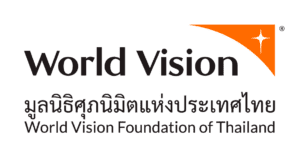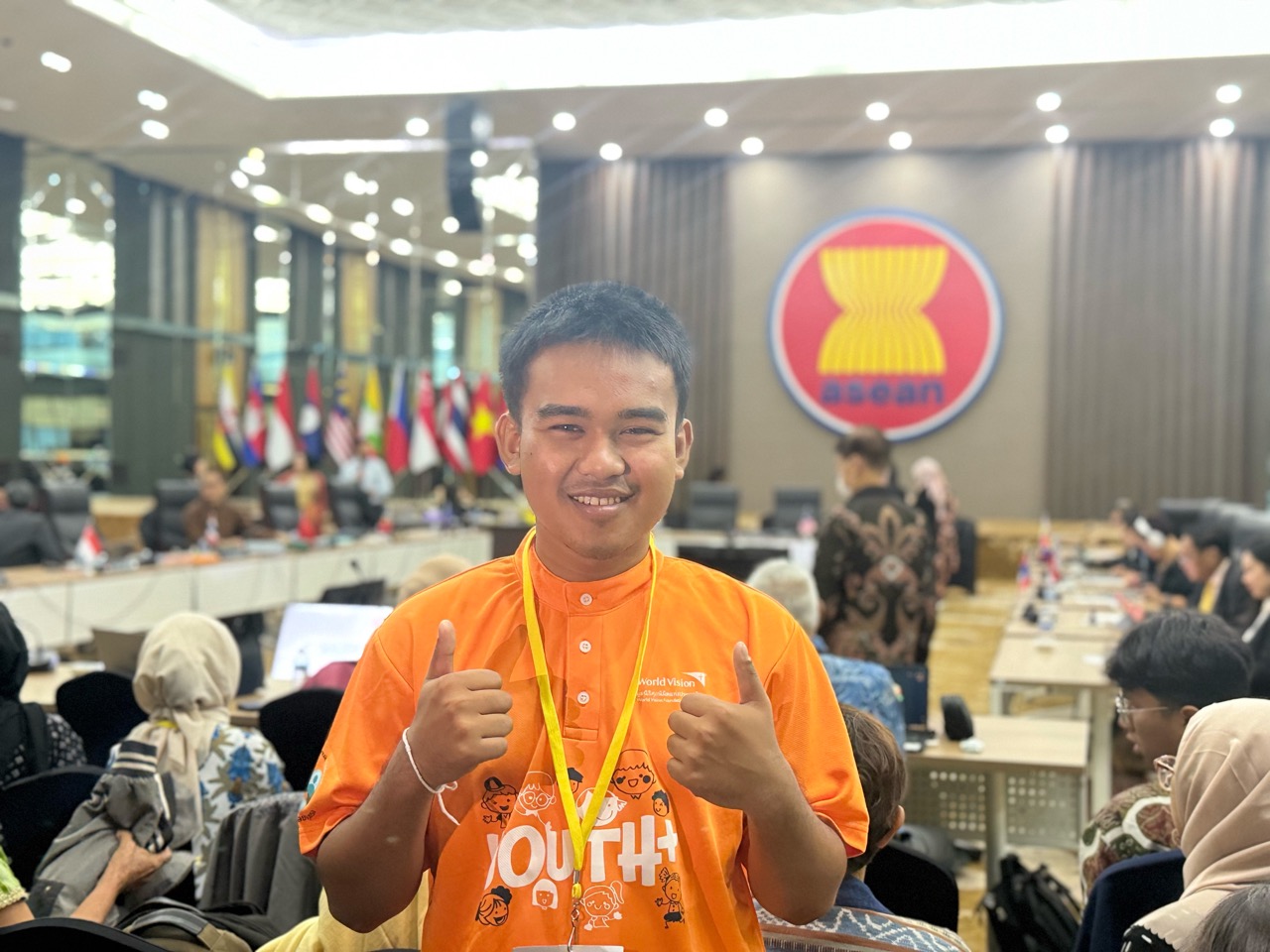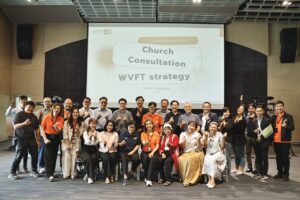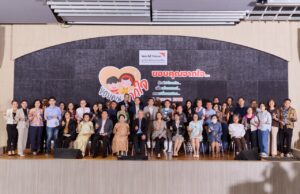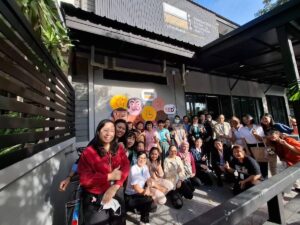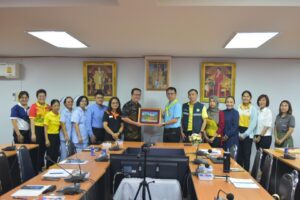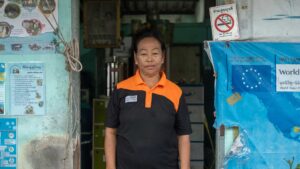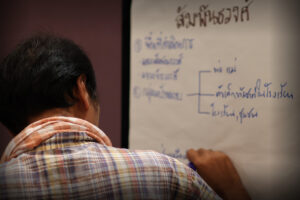“Hello, my name is Satsawat. You can also call me Ming. This was my first time travelling abroad. I had the opportunity to visit Indonesia as a representative of World Vision Thailand Children and Youth Council. I participated in the 2025 Regional Children’s Consultation for the 2nd ASEAN Plan of Action on the Elimination of Violence Against Children (RPA-EVAC). It was a regional ASEAN-level workshop for children to share their views and contribute to the development of the ASEAN Plan of Action on the Elimination of Violence Against Children. This event took place from May 13 to 15,” says Satsawat, or Ming, a 17-year-old from Surin Province. He is a former sponsored child of World Vision Thailand. Currently, Ming is the president of the student association at Krathiam Wittaya School and also serves as a member of World Vision Thailand Children and Youth Council.
ASEAN Member States have jointly declared the Declaration on the Elimination of Violence Against Women and the Elimination of Violence Against Children, affirming that every child should grow up in a society free from violence. This commitment is being advanced by ASEAN Member States through the ASEAN Regional Plan of Action on the Elimination of Violence Against Children (RPA on EVAC) 2016–2025. The ASEAN Commission on the Promotion and Protection of the Rights of Women and Children (ACWC) is currently in the process of preparing the next plan of action, which will be presented to ASEAN leaders at the ASEAN Summit in 2026.
“”We wanted to ensure that the ASEAN Plan of Action on the Elimination of Violence Against Children currently being developed truly reflects the voices of children and youth—especially their views on issues that affect their lives, and their insights into what has worked in the current plan and what needs improvement—this consultation also aims to help policymakers better understand the diverse dimensions and root causes of violence that children are experiencing. With the collaboration of Child Rights Coalition Asia, the ASEAN Commission on the Promotion and Protection of the Rights of Women and Children (ACWC), the ASEAN Intergovernmental Commission on Human Rights (AICHR), and the ASEAN Secretariat, a regional consultation forum with children was organised. Twenty-four children and youth from ASEAN countries participated, sharing their perspectives and developing recommendations that reflect their real needs for ending violence against children. These recommendations will be presented at the 41st meeting of the ASEAN Intergovernmental Commission on Human Rights as part of the process of drafting the new ASEAN Plan of Action on the Elimination of Violence Against Children,” Amornpajee Auppamai, Child Protection & Advocacy Advisor, World Vision Thailand, provided this context and emphasised the importance of this ASEAN-level consultation with children and youth.
Ming summarises his experience of participating in ASEAN-level policy advocacy on violence against children as follows: “It was three days mostly spent in the hotel, but it really opened up my world. There were three youth representatives from Thailand at the consultation. Although I faced language barriers with English, I received great support from Ms Ploy from World Vision Thailand, who helped me gain more understanding. I got to see different perspectives from youth across various countries, which inspired me to keep learning. The first two days focused on reflecting and giving feedback on the current ASEAN Plan of Action on the Elimination of Violence Against Children, which is set to conclude in 2025. We also participated in workshops to collaboratively develop recommendations. All of us then took part in the 41st Meeting of the ASEAN Intergovernmental Commission on Human Rights (AICHR), where we presented our group’s recommendations to ASEAN-level policymakers as part of the process of drafting the next Plan of Action. I am incredibly proud to have been part of this.”
Ming and his fellow youth who shared an interest in addressing the impact of violence on at-risk children affected by migration. The following is a set of recommendations that Ming and other ASEAN youth developed and presented to policymakers responsible for shaping ASEAN policies.
Migrant children in Thailand face serious barriers in accessing basic human rights, particularly in education and healthcare. Frequent migration, lack of legal documentation, and insufficient psychosocial support prevent them from receiving continuous education and timely medical treatment. These challenges place them at long-term risk in terms of development, emotional well-being, and social integration. As a result, inequality is exacerbated, and national commitments to children’s rights and inclusive development are undermined. Urgent policy action is needed to ensure that all children, regardless of their status, can access essential services and reach their full potential.
Governments should develop comprehensive service systems that ensure all migrant children—regardless of their legal status—can access essential services from the beginning of their migration journey through its entirety. These services should include education, healthcare, psychosocial support, and specialised care for pregnant women, girls, children of all gender identities, and children with disabilities. To ensure effective implementation, government officials and relevant agencies must be trained in child-friendly and non-discriminatory approaches that uphold the rights and dignity of every child. This will enable migrant children not only to survive but also to live and thrive as equal members of society.
Violence against children is not limited to physical or psychological harm caused by overtly violent acts. The dimensions of violence are far more complex, encompassing various triggers, motivations, and emotional drivers. Multiple factors contribute to and intensify violence against children, including technology related to computer systems, internet networks, and digital data—such as data protection, communication, and control systems in the online world. Other contributing factors include the climate crisis and the vulnerabilities of children affected by migration. These diverse dimensions and factors are increasingly manifesting as forms of violence against children.
Children are directly affected by all forms of violence. Listening to their voices, consulting with them, and creating safe spaces for children and youth to genuinely express their views are essential forms of participation. This kind of engagement leads to policy-driven efforts that benefit all children and contribute to a better life for them. Ming has served as a representative of all children and youth, bringing their voices and perspectives into the process of developing the ASEAN Plan of Action on the Elimination of Violence Against Children.
———-
2025 Regional Children’s Consultation for the 2nd ASEAN Plan of Action on the Elimination of Violence Against Children (RPA-EVAC), through the collaboration of Child Rights Coalition Asia (CRC Asia), ASEAN Commission on the Promotion and Protection of the Rights of Women and Children (ACWC), ASEAN Intergovernmental Commission on Human Rights (AICHR) and the ASEAN Secretariat, was supported by ChildFund, Plan International Asia Pacific, Save the Children Asia, SOS Children’s Villages International, World Vision International, ECPAT International and Terre des Hommes Germany – Southeast Asia.
